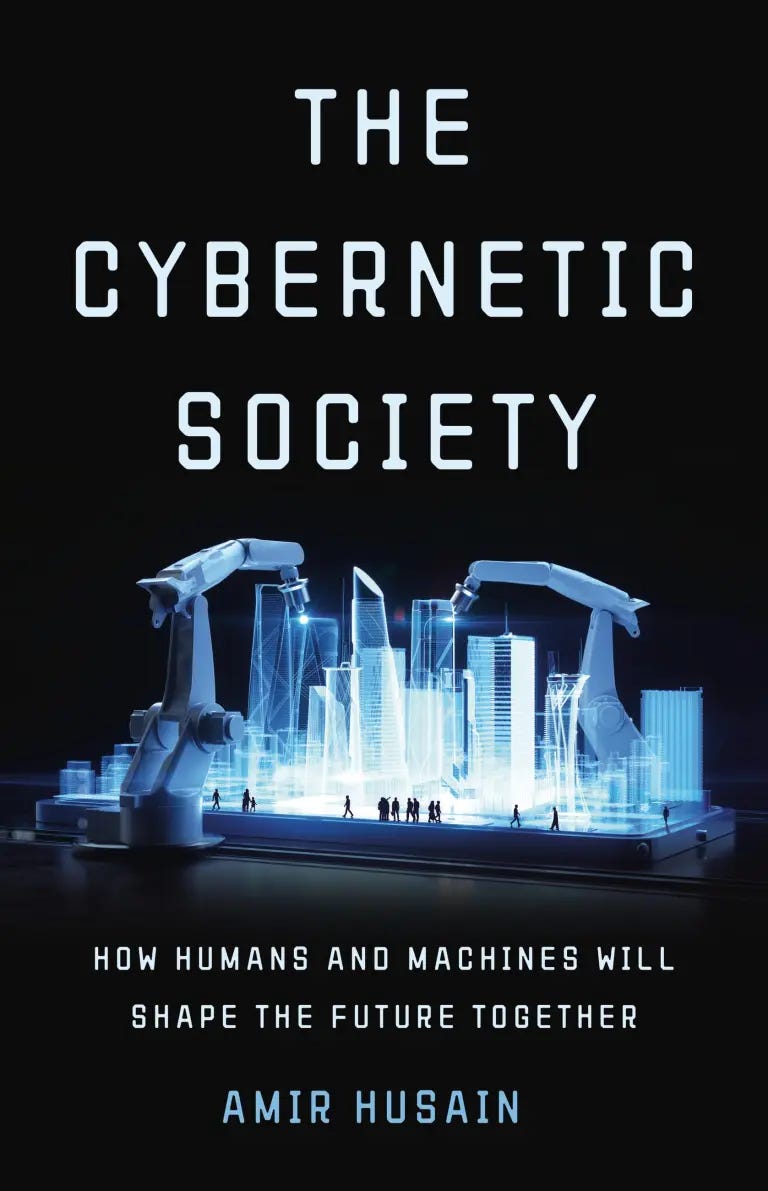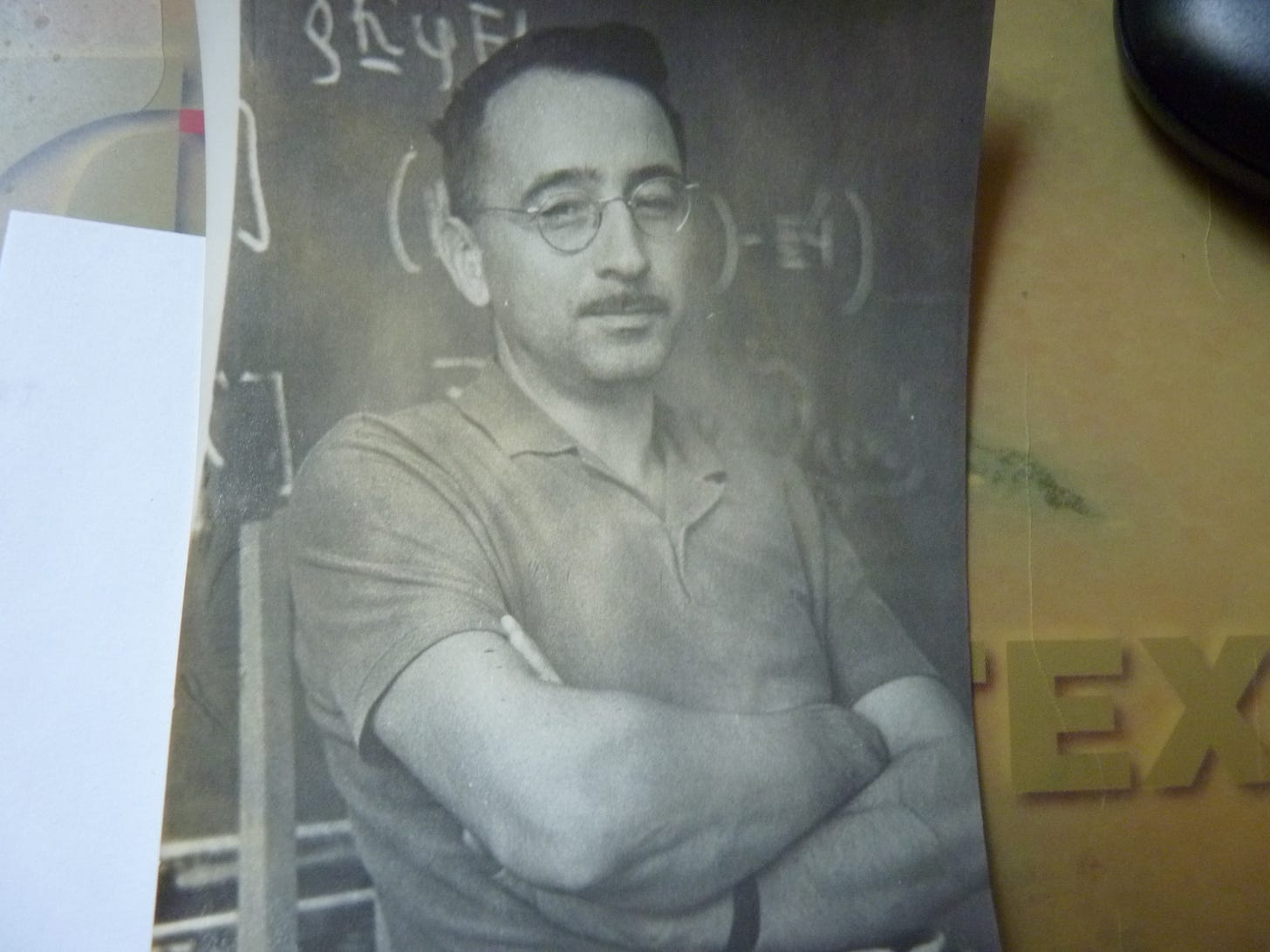Cliodynamics and Cybernetics
Reading The Cybernetic Society by Amir Husain
The subtitle of Amir Husain’s new book (published last week) gives you a good idea what the book is about: How Humans and Machines Will Shape the Future Together.
I really enjoyed reading this book and learned a lot from it. I must admit, though, that the subject of cybernetics is very dear to my heart, as I essentially grew up with its ideas. You see, my father, Valentin Turchin, was a cyberneticist. One enduring legacy that he left is the Principia Cybernetica Project.
Source: Turchin Family Archive
Back in the 1980s and 1990s, when I was asked what my father did, practically nobody heard of cybernetics and I had to explain what this science is about, as best as I could. Cybernetics is about information flows in, and adaptive management of, dynamical systems. The key concept in this science is that of causal feedback loops. As an illustration, think about steering a spaceship from Earth to Mars. There is a lot of calculation involved, as you need to predict the position of Mars in space in relation to the ship, various gravitational influences, and the effects of your engine’s thrust. And during the trip you need to obtain information about how your ship deviates from the optimal trajectory (as it inevitably will) and you have to constantly adjust your course based on this information. In other words, you need to establish a feedback loop that would allow you to steer your ship to get to the destination. This is where the name “cybernetics” comes from—from the Greek term for helmsman, the person who steers a ship.
In a way, I am also a cyberneticist like my father, because the idea of feedback loops is central to cliodynamics. Amir Husain devoted a chapter to this connection between cliodynamics and cybernetics (Chapter 7). Essentially, cliodynamics can be thought of as an application of the abstract principles of cybernetics to societal dynamics, including quite practical questions: now that we are in revolution, how do we steer our society to avoid the deadly shoals and reefs. This is a central question for me, and the main research focus for my group.
How will recent technological advances, especially in the field of Artificial Intelligence, help, or hinder this goal? While the tone of Husain’s book is generally optimistic, he also devotes a lot of attention to the dark side of the coming change. Let’s first talk about dystopian possible futures.
Chapter 9 of The Cybernetic Society begins with a quote from Sam Altman, the CEO of OpenAI, made in early 2024: “In my little group chat with my tech CEO friends, there’s this betting pool for the first year that there is a one-person billion-dollar company. Which would be unimaginable without AI and now will happen.” Clearly, Altman can’t wait to see this happen, but to me this represents a very dystopian future.
First, the idea of having a huge corporation consisting of a single person strikes me as completely “unhuman.” Human beings are intensely social creatures. Cooperating with others to achieve shared goals is part of human nature. A big chunk of enjoyment that we derive from work is collaborating with other people. Many workers, who had to work from home during the Covid times, noted that they missed that human interactions element of working in the office.
Second, the rise of CEOs of one-person billion-dollar companies will be a huge destabilizing factor for our societies. My book Ultrasociety devotes a lot of attention to “upstarts,” the narcissistic, and sometimes outright psychopathic, powerful and aggressive men (and they are almost always men) who attempt to set themselves up as bosses. Such upstarts, unless restrained, will acquire too much power and control over resources, to the detriment of everybody else in the social group. Forager societies evolved a broad variety of social mechanisms to control upstarts, ranging from mild (gossip and ridicule) to severe (exile and assassination).
But in early centralized societies, complex chiefdoms and archaic states, upstarts managed to shed such restraining mechanisms, setting themselves up as God Kings (see Chapter 7 in Ultrasociety). Today, it is not much of a stretch to see the rise of powerful multi-billionaires as modern God Kings. They wield huge amounts of power, but, fortunately for the rest of us, there are important constraints on their power. Most obviously, the state is still powerful enough to control them. Less obviously, they still have to rely on other people to exercise power (both in the economic and political domains). But a future God King whose power is based on AI and robots (including robotic soldiers) would be completely free from such constraints. This should be a terrifying thought for most of us.
Such a dystopia is not pre-ordained. In the follow up to this post, I’ll talk about more hopeful futures—how cybernetic ideas and cliodynamic technologies can help us steer societies in more positive directions.




Interesting reflection on the risks and possibilities that AI poses for society. I liked how you connect cybernetics with social dynamics to explain these scenarios.
Somewhat tangentially there was a wonderful satirical piece recently published (picked up and repeated by some global south boosters in alternative media circles) that seems to capture great power insecurities concerning the development of cybernetic technologies:
https://mythdetector.com/en/deepseek-was-built/
Russia, China and the US, this spoof had it all.